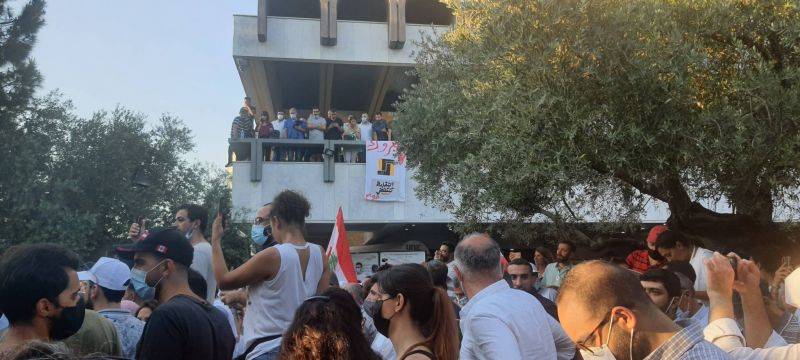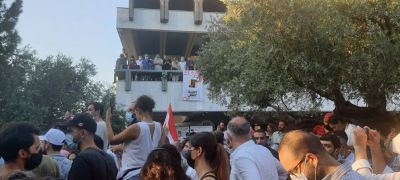
People gather during elections for the engineers' syndicate. (Credit: Salah Hijazi/L'Orient-Le Jour)
“It is incrementally resembling a wave.” That is how Karim Bitar, political scientist and director of the Institute of Political Science at Saint Joseph University, described the landslide victory of the anti-establishment coalition, The Order Revolts, in the first round of the Order of Engineers elections in July.
That is the most recent triumph of the Oct. 17, 2019, protest movement. In November 2019, just one month after huge demonstrations spread to every corner of the country, the opposition emanating from this movement elected Melhem Khalaf to head the Beirut Bar Association. In 2020, secular and independent groups also clinched victory in student body elections at several private universities.
These breakthroughs are significant: syndicates and professional orders have historically played a major role against the establishment — an asset they lost after the 1975-90 Civil War. “Since the end of the Civil War, the political class has made monstrous efforts to control and close the workers’ unions and movements to dissidents. Historically, the latter [the trade unions] had the chance to force governments and businesses to grant them social benefits,” Bitar added.
For instance, according to the Civil Society Knowledge Center, employees of the Lebanese Tobacco and Tunbac Monopoly Department went on strike in 1946 and occupied several factories, seeking wage increases and long-term employment contracts. Their actions resulted in the Lebanese government introducing a labor law. Almost 24 years later, nearly 1,200 employees at Ghandour, a food processing company, went on strike in 1972, refusing to return to work until pay increases enacted by the state were enforced.
Castro Abdallah, chairman of the National Federation of Workers and Employees Trade Unions in Lebanon, shares Bitar’s opinion. “Today, the General Confederation of Lebanese Workers is a mere shadow of what it once was. It has become a tool in the hands of the ruling class, protesting when asked to do so, and even working against the workers’ own interests at times. For instance, it opposed the then Labor Minister Charbel Nahas’ 2012 proposal on employees’ indemnity and minimum wage increase to LL975,000. It even argued that the minister overstepped his powers!” said Abdallah, whose group split off from the GCLW in 1987.
Seeking to gain more influence over the labor movement, the political class used division as a strategy. “In order to incapacitate syndicates, the political elite resorted to the hatching technique. The idea was to create several unions representing the same category of workers,” said a female expert focusing on labor movements, who declined to be name.
These new syndicates secured two seats in the GCLW’s assembly, granting their politico-confessional bosses more influence. “Hence, the number of syndicates registered in Lebanon increased two-fold between 1990 and 2000,” the expert added.
For example, today there are up to five unions representing cab drivers, according to a stakeholder in the sector. Successive labor ministers authorized the establishment of unions affiliated with their respective political families.
“Presently, Bassam Tleis, who is close to the Amal Movement, is the head of the Land Transport Unions, while other unions are close to Hezbollah and the Communists,” said Marwan Fayad, the head of the General Union of Taxi Drivers.
While his union was licensed in 2009, when Boutros Harb served as labor minister, Fayad stressed that the union’s establishment is the product of a non-politicized administrative effort, and that the union “employs its political affiliations to assist the drivers.”
“Also, our differences with other unions are not simply political. While we increased our fees on several occasions, Tleis would rather wait for the permission of the Transport Ministry,” Harb added.
Alternative trade union organizations
Yet, the large number of syndicates is not necessarily to the liking of the protest movement, which founded its own alternative grouping in the face of frequent politically co-opted unions.
“During the thawra [revolution], we formed the 'Lebanese Professionals Association.' This group is divided into several sectors, including health professionals, engineers, artists … etc. We are not a union, but we coordinate our activities so as to exert pressure and actively partake in the protest movement,” said Ghassan Issa, a founding member of the health professionals’ association, a new group in the health sector.
“We consist of more than 100 health professionals who not only fight for the rights of physicians, but also for the development of a national public health strategy, based on achieving universal health coverage and a comprehensive strategy to fight COVID-19,” he said.
This group of health professionals emanating from the thawra is gearing up for the Lebanese Order of Physicians’ elections.
“The voting has been put off several times, using the pandemic as an official pretext. It will finally be held on Oct. 17, and apparently there will be a battle between two coalitions: a political class coalition and an anti-establishment opposition coalition,” Tarek Hijazi, who is also a member of the association, said.
“The traditional parties’ alliance [usually] breaks down once the voting is over, and the order’s council is crippled by their differences. We will hopefully be able to break this dynamic,” he added.
For their part, independent journalists will not be able to take part in their syndicate’s elections, also scheduled for this year.
“We launched the Alternative Press Syndicate following the protest movement. The current syndicate is totally jammed and does not accept new membership applications in general. However, we are ready to join and participate in the elections, which are scheduled to be held soon,” Elsy Moufarrej, coordinator at the movement, told L’Orient-Le Jour.
The Press Editors’ Syndicate, however, denies that it blocks access to new journalists.
“On the contrary, we would be delighted to have them participate in the elections. However, [processing] membership applications requires a long time, because in accordance with Lebanese law, they need to be examined by a committee consisting of editors’ delegates who are represented by a Christian, and the owners of the newspapers who are represented by a Sunni. Yet, these two interest groups are in inherent conflict and the situation is often paralyzed. The owners have no interest in having their journalists join a syndicate. Efforts need to be made so as to change the law for a more inclusive syndicate,” a member of the syndicate’s council said on condition of anonymity.
A white-collar thawra
The anti-establishment dynamic is seemingly limited to white-collar professionals for the time being. “We can blame the majority of groups emanating from the protest movement for overlooking the workers and the working class. In Sudan, the protest movement succeeded in mobilizing the workers after making unrelenting efforts behind the scenes, which is why the revolution has been a success,” the above-mentioned expert said .
“The problem is that the most vulnerable workers are very much dependent on traditional clientelism, which ensures that they remain captives of the system. It is noteworthy that there are some breakthroughs. For instance, the employees of Ramco [a Lebanese waste management company that mostly hires people from Southeast Asia] staged three weeks of strike despite acute repression and vulnerability associated with their status as foreigners,” she added.
Her perspective converges with that of Siham Antoun, activist and a candidate in the 2018 legislative elections. “The engineers, lawyers and students in private institutions do not represent society. Rather, they represent the upper middle class. In order to witness a genuine change and similar outcomes in the legislative elections, it is necessary to involve the workers,” she said.
Whatever the case, the triumph of The Order Revolts is celebrated as a full-scale illustration of the advantages of unifying the thawra components as a prerequisite to achieving significant results in legislative elections, according to activists.
“The list was the product of an alliance between two coalitions: First is The Order Revolts, which consists of movements, including the Lebanese National Bloc, the Citizens in a State, the Lebanese Communist Party, Beirut Madinati … etc. Second is the Lebanese Opposition Front, which involves parties, such as the Independence Movement and the Kataeb. These groups have their rejection of the club of six (the major political parties’ heads) and of political confessionalism as a common denominator,” said Naji Abou Khalil of the Lebanese National Bloc, who assumed a role in the negotiations leading to this alliance.
This article was originally published in French in L’Orient-Le Jour. Translation by Joelle El Khoury.
